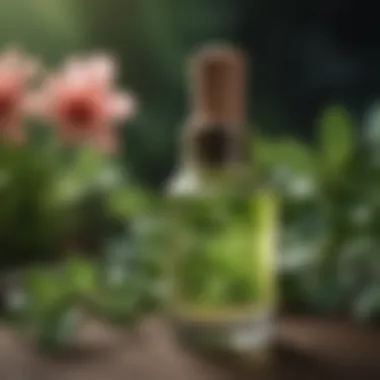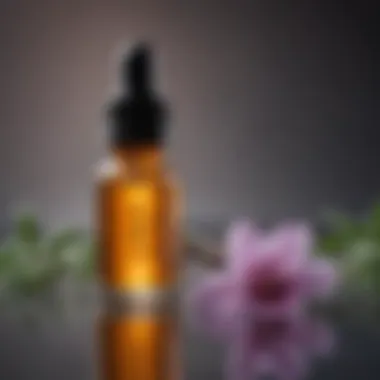Tips for Fast Cold Sore Relief: Your Comprehensive Guide


Fashion Trends and Must-Have Pieces
When it comes to dealing with cold sores, looking for solutions that offer quick relief becomes paramount. With the vast array of remedies available, from natural options to over-the-counter treatments, navigating through the plethora of choices can be overwhelming. In this comprehensive guide, we will delve deep into the effective strategies that can help you combat this common viral infection efficiently. By exploring various techniques and products, you can find the best approach to alleviate discomfort and bid farewell to cold sores swiftly and effectively.
Understanding Cold Sores
Understanding Cold Sores is a crucial aspect of this comprehensive guide on how to get rid of cold sores quickly and efficiently. By delving into the intricacies of cold sores, we can better equip ourselves to combat this common viral infection. Understanding the development, triggers, and progression of cold sores is essential in formulating effective treatment and prevention strategies. Additionally, grasping the impact of cold sores on our physical and emotional well-being emphasizes the importance of addressing them promptly for quick relief.
What Are Cold Sores?
The Basics of Cold Sores
The Basics of Cold Sores encompass the fundamental knowledge surrounding this viral infection. Exploring topics such as the herpes simplex virus type 1 (HSV-1) responsible for cold sores, the typical appearance of cold sores, and the cycle of outbreak and healing can provide valuable insights into managing and preventing these lesions. Understanding the contagious nature of cold sores and their prevalence among the population underscores the need for effective treatment methods to minimize discomfort and prevent recurrence.
Causes of Cold Sores
Causes of Cold Sores delve into the various factors that can trigger the reactivation of the HSV-1 virus, leading to cold sore outbreaks. Identifying common triggers such as stress, illness, sun exposure, and hormonal changes sheds light on proactive measures to reduce the frequency and severity of cold sore episodes. By understanding the root causes of cold sores, individuals can implement targeted strategies to mitigate outbreaks and promote faster healing times.
Symptoms to Look Out For
Symptoms to Look Out For serve as early indicators of an impending cold sore outbreak. Recognizing telltale signs such as tingling or burning sensations, redness, swelling, and the formation of fluid-filled blisters allows for timely intervention with appropriate treatments. Being aware of the stages of cold sore development, from prodrome to ulceration and crusting, empowers individuals to take proactive steps in managing symptoms and preventing the spread of the virus.
Difference Between Cold Sores and Canker Sores
Distinguishing Features
Distinguishing Features highlight the key disparities between cold sores and canker sores, aiding in accurate identification and treatment selection. Contrasting characteristics such as location (cold sores typically appear outside the mouth, while canker sores manifest inside the mouth), appearance (cold sores present as fluid-filled blisters, whereas canker sores are shallow ulcers), and causative factors (viral infection vs. immune system dysregulation) facilitate proper diagnosis and management strategies.
Understanding the Viral Origins
Understanding the Viral Origins delves into the specific mechanisms by which the herpes simplex virus causes cold sores. Exploring how HSV-1 establishes latency in nerve cells, reactivates in response to triggers, and travels to the skin surface to produce visible lesions elucidates the pathogenesis of cold sores. Understanding the viral lifecycle and the interplay between host immunity and viral replication informs therapeutic approaches aimed at controlling viral activity and minimizing lesion progression.
Prevention Strategies
Prevention strategies in dealing with cold sores are crucial for minimizing outbreaks and reducing discomfort. Understanding the importance of maintaining immune health and incorporating lifestyle changes is key in effectively combating this viral infection. By harnessing the power of the immune system and adopting healthy habits, individuals can boost their defenses against the herpes simplex virus responsible for cold sores. These strategies not only help in preventing initial outbreaks but also aid in managing and reducing the frequency of recurring sores, promoting overall well-being.


Maintaining Immune Health
Role of Immune System
The immune system plays a pivotal role in defending the body against pathogens, including the herpes simplex virus responsible for cold sores. By strengthening the immune system through adequate nutrition, stress management, and healthy lifestyle choices, individuals can enhance their body's ability to ward off viral infections effectively. A robust immune system recognizes and targets the virus, limiting its replication and mitigating the severity and duration of cold sore outbreaks.
Nutritional Strategies
Nutrition plays a critical role in supporting immune health and combating cold sores. Incorporating foods rich in vitamins, minerals, and antioxidants, such as fruits, vegetables, nuts, and lean proteins, can bolster the immune response and reduce the susceptibility to viral infections. Additionally, staying hydrated, limiting processed foods high in sugars and unhealthy fats, and maintaining a balanced diet are essential components of nutritional strategies to enhance immune function.
Lifestyle Changes
Stress Management Techniques
Effective stress management is paramount in cold sore prevention as stress can weaken the immune system and trigger recurrent outbreaks. Engaging in relaxation techniques such as deep breathing, meditation, yoga, or regular exercise can help reduce stress levels and support immune function, preventing cold sore flare-ups. By prioritizing mental well-being and finding healthy coping mechanisms, individuals can minimize the impact of stress on their immune health.
Healthy Habits for Cold Sore Prevention
Implementing healthy habits like getting an adequate amount of sleep, regular exercise, and practicing good hygiene are essential in preventing cold sores. Ensuring proper hygiene practices, such as avoiding sharing personal items and keeping the affected area clean, can reduce the risk of spreading the virus to other body parts or individuals. By adopting these healthy habits consistently, individuals can create a protective shield against cold sore outbreaks and maintain optimal immune function.
Natural Remedies
Exploring natural remedies is a crucial aspect of combating cold sores effectively. These remedies offer a gentler yet potent alternative to traditional treatments, often with fewer side effects. By harnessing the power of nature, natural remedies aim to address the root cause of cold sores while providing relief from symptoms. In this article, we will delve into various natural remedies to equip you with a comprehensive understanding of alternative treatment options.
Herbal Treatments
Aloe Vera Gel
Aloe Vera gel stands out as a prominent herbal treatment for cold sores due to its soothing and healing properties. The gel derived from Aloe Vera plants contains anti-inflammatory and antimicrobial compounds that can aid in reducing inflammation, promoting wound healing, and combating viral infections. Its cooling effect can also alleviate the discomfort associated with cold sores. Aloe Vera gel's ease of application and widespread availability make it a practical choice for individuals seeking natural relief from cold sores.
Lemon Balm
Lemon Balm, also known as Melissa officinalis, is another herbal remedy celebrated for its antiviral properties. Rich in compounds like rosmarinic acid and flavonoids, Lemon Balm exhibits potent antiviral activity against the herpes simplex virus, the culprit behind cold sores. Applying lemon balm topically can help in reducing the duration and severity of cold sore outbreaks. Its calming effects on the skin make it a popular choice for those looking for a natural approach to managing cold sores.
Essential Oils


Tea Tree Oil
Tea Tree Oil, derived from the leaves of the Melaleuca alternifolia plant, is renowned for its antiviral and antibacterial properties. Its active component, terpinen-4-ol, demonstrates strong antiviral effects against various viruses, including the herpes simplex virus. When applied topically, Tea Tree Oil can help in drying out cold sores, reducing inflammation, and preventing secondary infections. Its natural nature and efficacy make it a sought-after option for individuals preferring natural remedies for cold sores.
Lavender Oil
Lavender Oil, extracted from lavender flowers, is prized for its soothing aroma and versatile therapeutic properties. In the context of cold sores, Lavender Oil's antiviral and anti-inflammatory qualities can aid in speeding up the healing process and alleviating discomfort. Additionally, its calming scent can contribute to relaxation and stress reduction, which are crucial factors in managing cold sore outbreaks. With its holistic approach to cold sore treatment, Lavender Oil appeals to individuals seeking a natural and aromatic remedy.
Over-the-Counter Solutions
In the realm of cold sore treatment, over-the-counter solutions hold a significant position for individuals seeking swift relief. These solutions offer accessible and practical options for managing the symptoms of cold sores without the need for a prescription. Countless individuals turn to over-the-counter remedies due to their convenience and effectiveness in alleviating discomfort associated with cold sores. Within the context of this article, exploring over-the-counter solutions unveils a range of products and formulations designed to combat the herpes simplex virus responsible for cold sores.
Antiviral Creams
Docosanol (Abreva)
Docosanol, commonly known under the brand name Abreva, stands out as a pivotal player in the realm of antiviral creams for cold sore treatment. Its specific formulation targets the cold sore virus, hindering its replication and spread. The key characteristic of Docosanol lies in its ability to reduce cold sore healing time significantly, providing individuals with expedited relief. This cream boasts a reputation for its efficacy in minimizing the severity of cold sores and accelerating the natural healing process. However, despite its effectiveness, some may find Docosanol relatively expensive compared to other over-the-counter options, which could be a potential downside for budget-conscious consumers.
Acyclovir
Acyclovir represents another cornerstone in antiviral creams formulated to combat cold sores effectively. It plays a crucial role in inhibiting the growth and development of the herpes virus, addressing the root cause of cold sore outbreaks. The distinctive feature of Acyclovir lies in its potent antiviral properties, making it a go-to choice for managing recurrent cold sores. Its reputation for promoting rapid healing and reducing the duration of outbreaks solidifies its status as a popular choice among individuals seeking quick relief. Yet, some users may experience mild side effects such as skin irritation or dryness with Acyclovir usage, indicating a potential drawback to consider.
Topical Analgesics
Benzocaine Creams
Benzocaine creams emerge as vital players within the realm of topical analgesics for cold sore treatment. These creams offer localized pain relief by numbing the affected area, alleviating discomfort associated with cold sores. The key characteristic of Benzocaine creams lies in their fast-acting nature, providing instant relief from the stinging or burning sensations common during cold sore outbreaks. Widely recognized for their efficacy in reducing pain and soreness, Benzocaine creams serve as a popular choice for individuals seeking immediate comfort. However, prolonged use or excess application of Benzocaine creams may lead to potential side effects like skin irritation or allergic reactions, warranting cautious usage.
Lysine Ointments
Lysine ointments play a pivotal role in cold sore management, offering a targeted approach to reducing viral replication and promoting healing. The key characteristic of Lysine ointments lies in their ability to combat the herpes virus by interfering with its ability to multiply, thus limiting the spread of cold sores. As a beneficial choice endorsed by many individuals, Lysine ointments are praised for their effectiveness in reducing the frequency and severity of outbreaks. However, it is essential to note that some individuals may experience minimal side effects like gastrointestinal disturbances with prolonged use of Lysine ointments, underscoring the importance of moderation and adherence to usage instructions.
Medical Intervention
In the realm of combating cold sores, medical intervention plays a pivotal role in swiftly addressing the symptoms and curbing the viral infection. When natural remedies and over-the-counter solutions fall short, turning to prescription medications and professional treatments becomes imperative. These options provide targeted relief and help expedite the healing process, reducing both the severity and duration of cold sores.


Prescription Medications
Valacyclovir
Valacyclovir is a cornerstone in the treatment of cold sores, known for its potent antiviral properties. By inhibiting the replication of the herpes simplex virus, Valacyclovir effectively diminishes the outbreak's intensity and spread. Its oral formulation ensures systemic circulation, reaching the site of infection rapidly. This medication stands out for its high efficacy in reducing healing time and alleviating discomfort associated with cold sores. However, some individuals may experience minor side effects such as nausea or headache while on Valacyclovir.
Famciclovir
Famciclovir, another potent antiviral agent, plays a significant role in managing cold sore outbreaks. Similar to Valacyclovir, Famciclovir acts by impeding viral replication, curbing the progression of cold sores. Its distinct advantage lies in its convenient dosing schedule, making it a preferred choice for individuals seeking ease of administration. Despite its efficacy, some users may encounter adverse reactions like dizziness or fatigue during Famciclovir therapy.
Professional Treatments
Laser Therapy
Laser therapy stands at the forefront of professional treatments for cold sores, offering a non-invasive and targeted approach to lesion destruction. By harnessing specific wavelengths of light, laser therapy effectively eliminates the herpes simplex virus present in the affected area. This targeted method minimizes damage to healthy tissue while accelerating the healing process. Laser therapy's precision and efficacy make it a sought-after option for individuals aiming for rapid cold sore resolution.
Cryotherapy
Cryotherapy emerges as a popular choice for individuals seeking swift cold sore relief. This technique involves applying freezing temperatures using liquid nitrogen to the affected area, causing the cold sore to blister and fall off. Cryotherapy's rapid freezing action not only aids in lesion removal but also alleviates associated pain and discomfort. While highly effective, some individuals may experience mild skin irritation post-treatment with cryotherapy.
Lifestyle Recommendations
In this segment, we delve deep into the crucial aspect of Lifestyle Recommendations within the comprehensive guide on getting rid of cold sores swiftly and effectively. Lifestyle Recommendations play a pivotal role in not only treating existing cold sores but also in preventing future outbreaks. By focusing on specific elements such as managing stress levels, adopting healthy habits, and making mindful choices in daily routines, individuals can fortify their immune systems and reduce the likelihood of cold sore flare-ups. Understanding the relevance of Lifestyle Recommendations empowers individuals to take proactive steps in managing their cold sore condition more efficiently. Emphasizing the significance of a holistic approach that combines both medical interventions and lifestyle modifications, this section aims to provide practical advice that can be easily incorporated into daily life.
Protective Measures
Avoiding Triggers
When it comes to Avoiding Triggers in the context of cold sore management, the specific aspect of identifying and steering clear of factors that precipitate cold sore outbreaks is paramount. By pinpointing triggers such as certain foods, stress-inducing situations, or exposure to extreme weather conditions, individuals can proactively minimize the likelihood of developing cold sores. The key characteristic of Avoiding Triggers lies in its preventive nature, offering a preemptive strategy to reduce the frequency and severity of cold sore episodes. This proactive approach proves beneficial in not only alleviating discomfort but also in enhancing overall quality of life. By recognizing the unique feature of Avoiding Triggers and its role in cold sore prevention, individuals can gain better control over their condition and experience fewer interruptions due to recurrent outbreaks.
Proper Hygiene Practices
Within the realm of cold sore management, Proper Hygiene Practices serve as a critical component in maintaining optimal skin health and preventing the spread of the herpes simplex virus. This specific aspect focuses on cleanliness measures such as regular handwashing, avoiding sharing personal items, and keeping affected areas clean and dry. The key characteristic of Proper Hygiene Practices lies in its ability to reduce the risk of viral transmission to other parts of the body or to close contacts. By adhering to proper hygiene protocols, individuals can contain the spread of the virus and promote faster healing of cold sores. Understanding the importance of maintaining good hygiene practices not only accelerates recovery but also minimizes the chances of secondary infections, safeguarding overall health in the long run.
Dietary Considerations
Foods to Limit
When addressing Foods to Limit in the context of managing cold sores, the focus is on identifying and minimizing the consumption of trigger foods that can exacerbate cold sore symptoms. By pinpointing foods high in arginine such as chocolate, nuts, and seeds, individuals can reduce the risk of triggering cold sore outbreaks. The key characteristic of Foods to Limit lies in their potential to aggravate the viral infection, leading to prolonged healing times and increased discomfort. By understanding the unique feature of Foods to Limit and their impact on cold sore management, individuals can make informed dietary choices that support overall skin health and immune function.
Nutrient-Rich Choices
On the flip side of dietary considerations, Nutrient-Rich Choices play a vital role in supporting immune function and promoting skin healing in individuals prone to cold sores. By emphasizing the consumption of foods rich in lysine, vitamins C and E, and zinc, individuals can bolster their immune systems and shorten the duration of cold sore episodes. The key characteristic of Nutrient-Rich Choices lies in their ability to provide essential nutrients that aid in tissue repair and reduce inflammation, contributing to faster cold sore recovery. Understanding the unique feature of Nutrient-Rich Choices and their positive impact on cold sore management empowers individuals to make dietary decisions that support both skin health and overall well-being.







